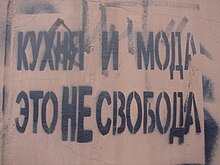
| Part of a series on |
| Feminism |
|---|
 |
|
|
In Russia, feminism originated in the 18th century, influenced by the Age of Enlightenment in Western Europe and mostly confined to the aristocracy. Throughout the 19th century, the idea of feminism remained closely tied to revolutionary politics and to social reform. In the 20th century Russian feminists, inspired by socialist doctrine, shifted their focus from philanthropic works to labor organizing among peasants and factory workers. After the February Revolution of 1917, feminist lobbying gained suffrage,[1] alongside general equality for women in society. Through this period, the concern with feminism varied depending on demographics and economic status.[2]
After the dissolution of the Soviet Union in 1991, feminist circles arose among the intelligentsia, although the term continues to carry negative connotations among contemporary Russians. In the 21st century, some Russian feminists, such as the punk-rock band Pussy Riot, have again aligned themselves with anti-government movements, as in the 2012 demonstrations against Russian president Vladimir Putin, which led to a lawyer representing the Russian Orthodox Church calling feminism a mortal sin.[3]
- ^ Ruthchild 2010, p. XVIII.
- ^ Carnaghan & Bahry 1990, pp. 390–391.
- ^ The New York Times & 8 August 2012.